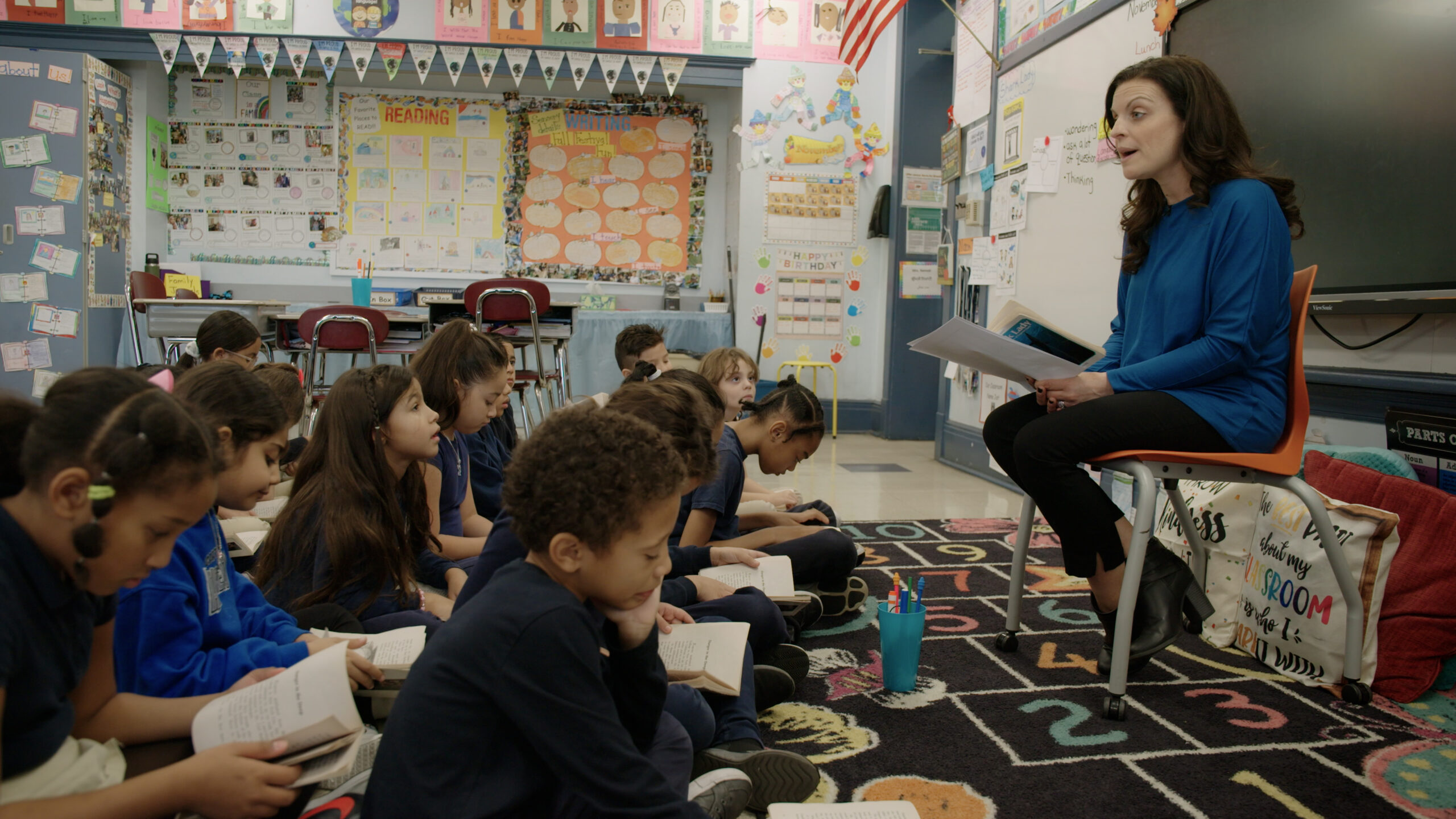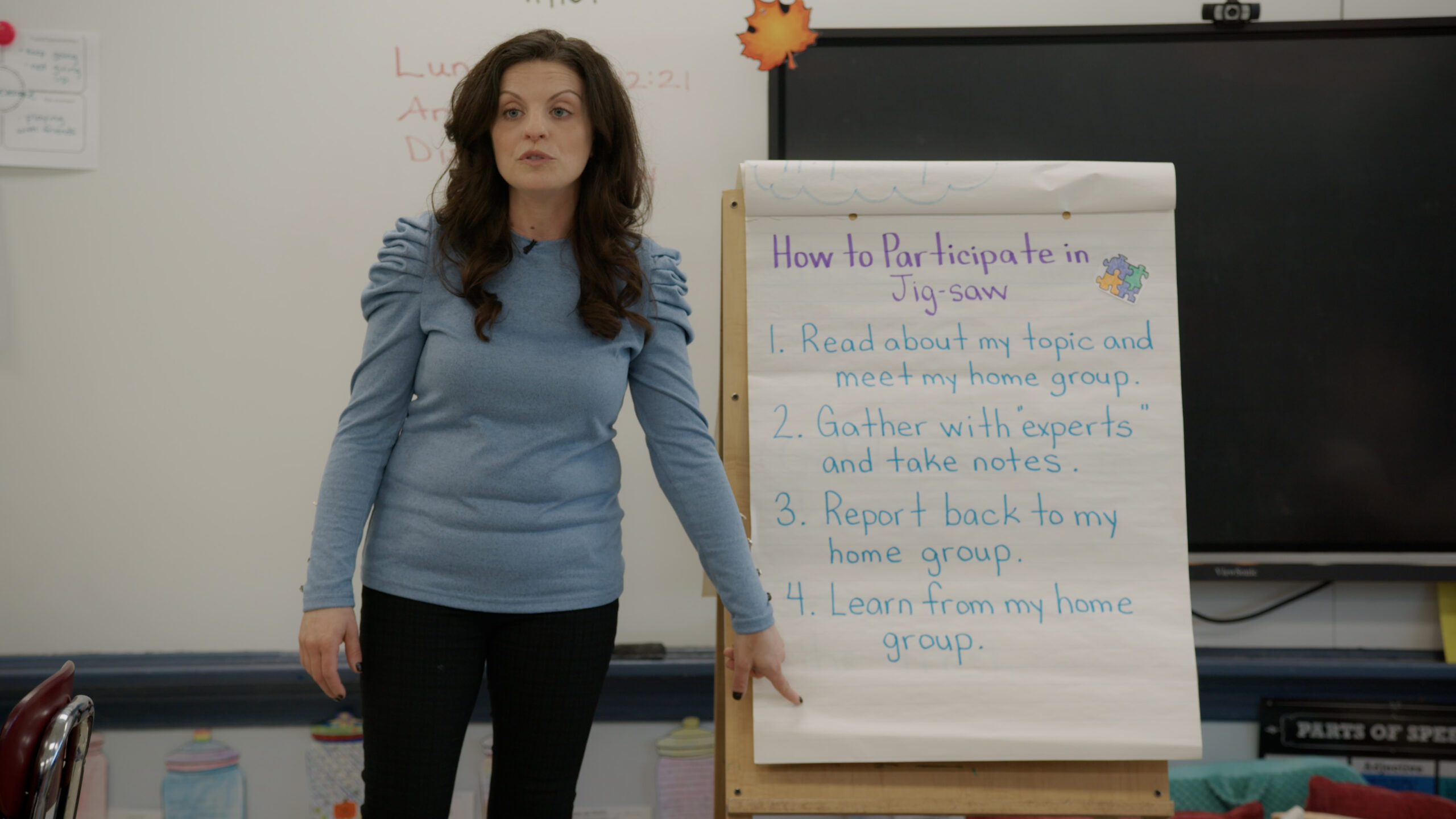Analyzing Nonfiction with Predictions
Overview
This video showcases the instruction during a class read. The teacher supports students in building content knowledge by coming up with predictions and determining if the predictions are confirmed after reading the chapter together. The teacher uses opportunities for partner discussion and encourages students to provide evidence from the text to support their claims.
Key Take-aways
• Using a variety of texts on similar topics allows students the time to build content knowledge and learn new vocabulary in a systematic and organized manner.
• Encourage students to use evidence from the text to support their thinking.
• Use every opportunity for students to discuss their thinking and support achieving comprehension.
Transcript
Dr. Ken Kunz: Join us as Mrs. Namati nurtures sequential and systematic content knowledge development as students enter the world of Eugenie Clark through the pages of Shark Lady.
Teacher: Who can tell me what a prediction is? We’ve been working with predictions. What happens when you make a prediction? Jerilyn?
Student(s): What we think we know.
Teacher: Okay. What we think we know.
Student(s): Predicts means like before you read the chapter, you predict what’s going to happen by reading what the chapter’s going to be about.
Teacher: Okay. Very good. So when we predict, we use evidence from our reading to help us say what’s going to happen next. Right? Why are predictions important in reading? I want you to turn and talk to your reading buddies. Okay. Let’s come back to me. Who would like to share their thinking? Lorenzo?
Student(s): It’s Fun.
Teacher: Absolutely.
Student(s): So, like if you predict something and you’re not reading the story first, you might predict something about, about like important information.
Teacher: Absolutely.
Student(s): You start reading the book, you realize that you’re right.
Teacher: Yes. Absolutely. So, predictions can even help us understand the story better. They can help us make our connections. They can encourage us to read more. Okay. About the topic, right? Okay. I want everybody to think. Don’t open your books yet. The chapter that we are going to read today is called Trouble with Grandma. Now, from our morning message this morning and from our previous reading, we remember that grandma and mom, they were so encouraging of Eugenie to follow her dreams, right? They got her fish tanks. They took her to the aquarium. They were really helping her foster her love of becoming a scientist, right? So I want you to turn and talk again to your partners. I want you to make predictions about what you think the chapter is going to be about today. Trouble with Grandma. Go ahead.
Teacher: Oh, I like that Gabriela. I was thinking that too. Who would like to tell me what they think the chapter’s going to be about? We are going to do our RAN strategy. So, remember first we have to make a prediction, right? We have to say what I think. I know we have to predict what’s going to happen in this chapter. What do you think the trouble with grandma’s going to be? What are you thinking? What do you think? Norra? What are you thinking?
Student(s): That she doesn’t want her to be a scientist.
Teacher: Oh, maybe she changes her mind and she doesn’t want her to be a scientist, right? Maybe grandma changes her mind about becoming a scientist. Okay, so everybody open up to page 20. You are going to listen to me read the book to you and then we’re going to see if our predictions were confirmed or if it was a misconception. Okay?
Teacher: Alright. Trouble with Grandma. Eugenie’s zoo grew. Besides hundreds of fish, there were salamanders, toads, and snakes in her house. Remember in those fish tanks, okay? When Eugenie went to college, she was more interested in fish than in any other animal. Hmm? Now I’m thinking about something right here. Eugenie is off to college now. So that means… you remember how our picture book was going in sequence of her life, okay? Now Eugenie is growing up. She’s in college, okay? But in order to learn about fish, she had to study all kinds of creatures.
Teacher: So, let’s get back to our predictions. Okay? You can close your books. Our first prediction was she changes her mind about being a scientist. Do you think that was confirmed or a misconception? What do you think? Christian?
Student(s): Misconception.
Teacher: It was definitely a misconception. Okay. She didn’t change her mind about wanting to be a scientist. She wants to be a scientist even more now, right? So our next prediction says Grandma fosters her love of her fish. Okay? What are you thinking with this one? Confirmed or misconception? Talk to your reading buddies and this time try to give me evidence from the book to support your answer. Go ahead. Okay, come on back. What are we thinking? Is it confirmed or a misconception? Elise, can you tell me? What do you think about this one?
Student(s): I think It’s a misconception ’cause they never talked about her grandmother fostering her love of learning fish.
Teacher: You’re right. Okay. In this chapter, grandma was a little bit angry with Eugenie, right? Okay. So that was a misconception. What about.. they get into an argument or a fight? How about we talk to our reading buddies about this? Go ahead. Okay, come back to me. What do we think of this one? Lexi?
Student(s): Confirmed.
Teacher: Why is it confirmed? Can you tell me? Can you give me evidence? What happened in the chapter?
Student(s): In the chapter, they were fighting.
Teacher: They were fighting. What about Eugenie gets more fish? What do you think? Jayden?
Student(s): A misconception because she didn’t get more fish.
Teacher: You’re right.
Student(s): She got the monkey and a dead rat.
Teacher: Oh, you’re right. Excellent. Misconception. I love it. And what about, so this prediction says she’s entertained. We were talking about grandma here. Do you think grandma was entertained in this chapter? This time, we’re going to do it a little bit different. On the count of three, you are going to tell me if you think this prediction is either confirmed or a misconception. So the prediction was she was entertained, right? Do you think that was a, uh, do you think it was confirmed or a misconception? On the count of three, you’re going to shout it out. 1, 2, 3.
Student(s): Misconception.
Teacher: In this book, in our chapter book, shark Lady, we learned that grandma and Eugenie have an argument, right? We started off with our picture book about Shark Lady. Did we learn about an argument in this book between Grandma and Eugenie? What are you thinking? Scarlet?
Student(s): No.
Teacher: No. We never learned about an argument in this book. Grandma and Mama were really just fostering her love of learning about fish, right?
Dr. Ken Kunz: While it’s not about being right or wrong with their predictions, students see the importance of monitoring and adjusting their thinking. This becomes visual as students support their thinking with reasoning.


